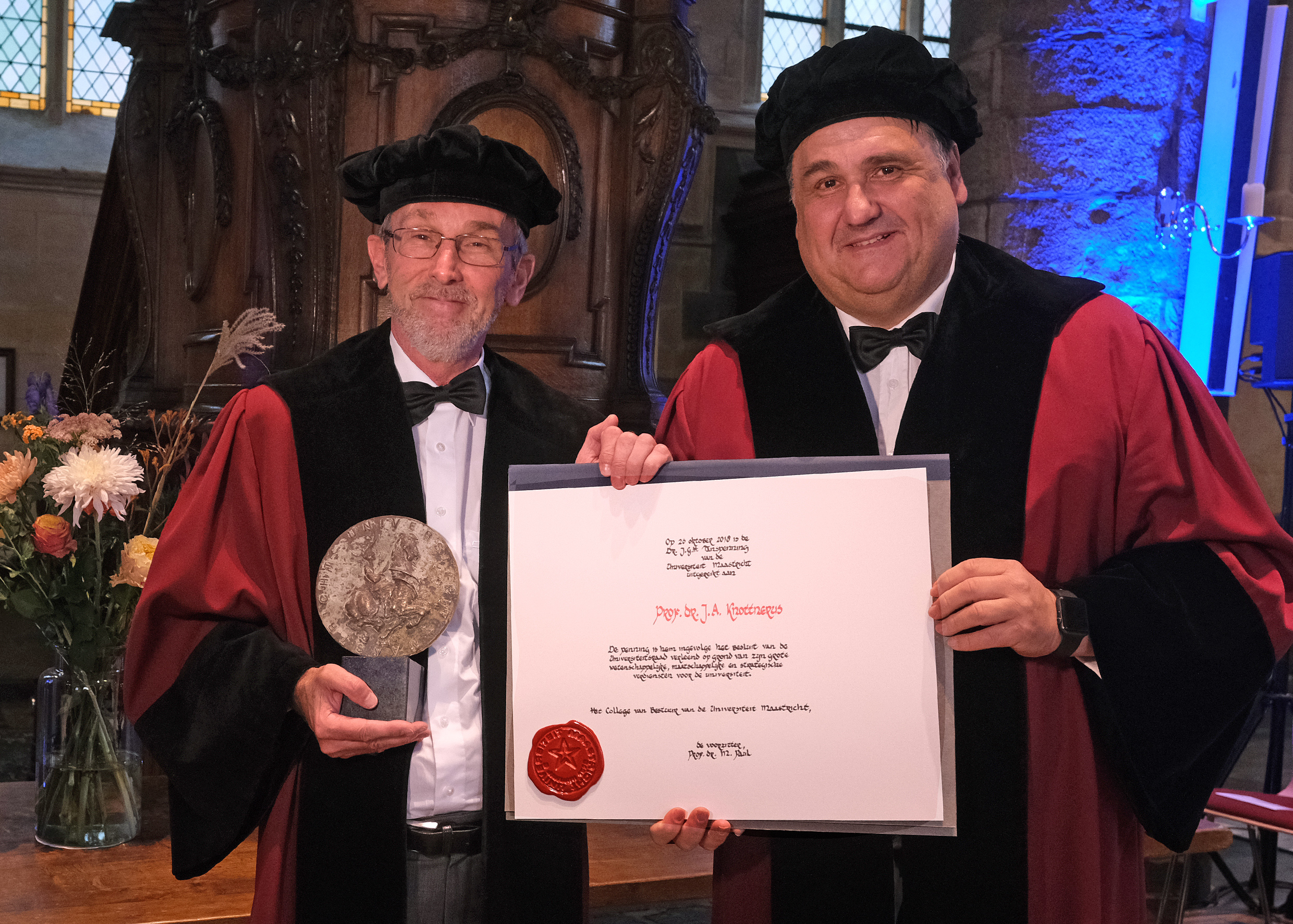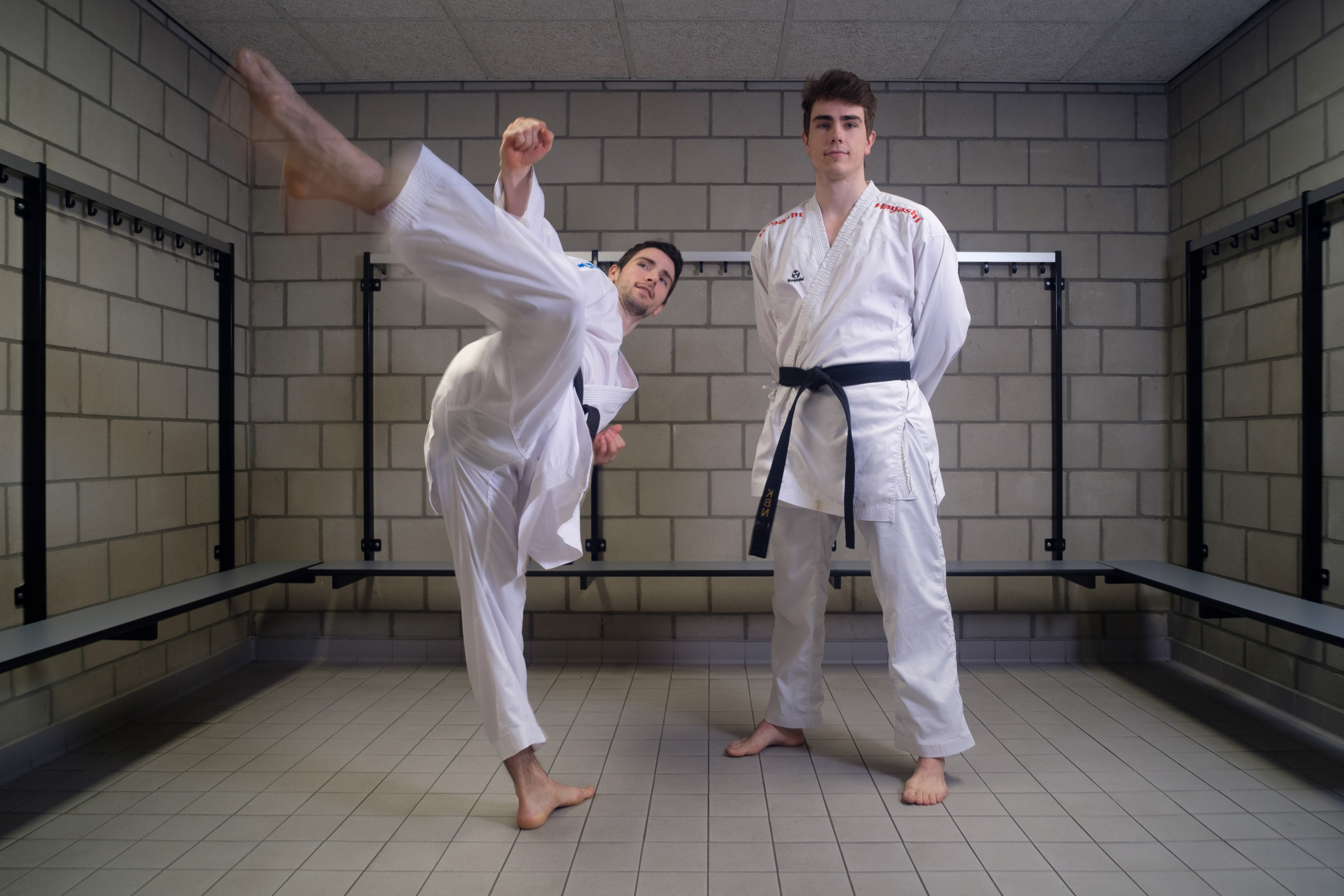UM bids farewell to Professor Knottnerus
André Knottnerus, professor of General Practice at Maastricht University, delivered his valedictory lecture today (26 October). Professor Knottnerus is a former president of the Health Council of the Netherlands and former chair of the Scientific Council for Government Policy. In his 36 years at UM, he made important contributions to both the development of the Department of General Practice and the status of this branch of medicine far beyond Maastricht. Colleagues call him ‘by far the most talented researcher in Western European general practice’. Knottnerus was involved in the founding of CAPHRI, the UM research institute for public health and healthcare innovation. His scientific work focuses on clinical epidemiology and the use of applied research in everyday medicine, particularly in the field of general practice and other areas of extramural care.

Highest UM distinction
During the valedictory ceremony, UM President Prof.dr. Martin Paul presented André Knottnerus with the Tans medal for his contributions to science and society. The Dr J.G.H. Tans medal, named after the university’s co-founder and first president, is the highest distinction awarded at UM.
André Knottnerus (1951) studied medicine at VU Amsterdam, where he trained as a general practitioner (GP). He worked as a GP and at the VU until 1982, when he relocated to UM for his epidemiology training. He received his PhD in 1986 on the development and application of clinical epidemiological research methods in the area of diagnostics; two year later, he was appointed professor. He served as president of the Health Council of the Netherlands from 2001 to 2010 and chaired the Scientific Council for Government Policy (WRR) from 2010 to 2017.
Contribution to general practice
In the 1980s, GPs in the Netherlands were undervalued compared to other medical specialists. Their work was often based on research conducted in hospital populations, though their patients have very different characteristics. Throughout his career, Knottnerus drew attention to the fallacy of this approach and strengthened the position of epidemiology in general practice research.
Valedictory lecture: the evidence arena
Knottnerus’s valedictory lecture focuses on the ‘evidence arena’, as did the symposium earlier today. ‘The need for knowledge and the development of knowledge are and will always be relevant’, he says. ‘But the route from knowledge to social progress – which is precisely where knowledge can make a difference – is also a scene of battle, an arena. An evidence arena, populated not just with knowledge and facts but also with all sorts of competing actors, factors and interests. An arena in which creativity, enthusiasm and engagement play out, but also conflict and opposition.’
From anti-vaxxers to citation scores
In his valedictory lecture the professor discusses ‘anti-vaxxers’ – people opposed to vaccination – and points out that the percentage of fully vaccinated two-year-olds in the Netherlands has dropped in recent years from 95% to 90.2%. In his view, ‘it is morally defensible to reject non-vaccinated children from day-care centres [as] the ultimate motivational signal’. He also insists that ‘quality, integrity and independence’ should be basic requirements for researchers today. ‘Delivering quality is not possible without rigorous quality assessment, including the social-responsibility perspective. This is why science, which hinges on reliability and validity, can no longer let its course be determined by defective instruments like impact factors and citation scores. … This situation can lead to risk-avoiding behaviour whereby the prospect of doing difficult, labour-intensive and large-scale research that pays off only in the long term becomes less attractive – yet it is precisely this type of research that general practice medicine needs.’
The person behind the professor
One of five sons of a preacher’s family in the northeast of the Netherlands, André Knottnerus was raised on the principle of social responsibility. Indeed, his colleagues praise not only his expertise, but also his versatility, integrity, social engagement and modesty. Despite undertaking many activities outside the university, he remained closely involved in research, much to the admiration of colleagues both in- and outside his department.
Following the lecture in the Sint Janskerk, UM rector Rianne Letschert thanked Professor Knottnerus, on behalf of the Executive Board, for his contributions to the development of general practice both within and far beyond Maastricht.
And more …
André Knottnerus has supervised 69 PhD candidates, (co-)authored more than 450 articles in international medical and public health journals, written various books and published more than 300 articles in national journals and magazines. He is also, as indicated in his UM staff profile, a blood donor and registered organ donor. Despite heading into retirement, he is unlikely to rest on his laurels.
Also read
-
Maastricht University received grants for three of the ten research projects starting in the National Growth Fund program Circular Plastics NL.
-
UM alumni Brian and Rob Timmermans combined their degrees in Econometrics and Sustainable Finance with their passion for karate, resulting in an ever-expanding trophy collection. Both brothers are multi-time and reigning Dutch champions in their respective weight classes and have achieved success on...
-
Maastricht University takes care of many distinctive buildings and art works that we all know. By giving them a new purpose, we preserve these icons and give them a new meaning, making them the vibrant heart of a bustling city.
Did you know that these buildings and art works also provide access to...


